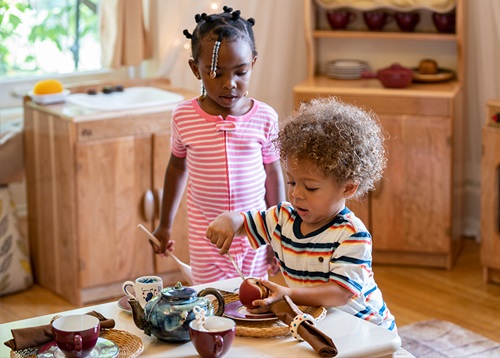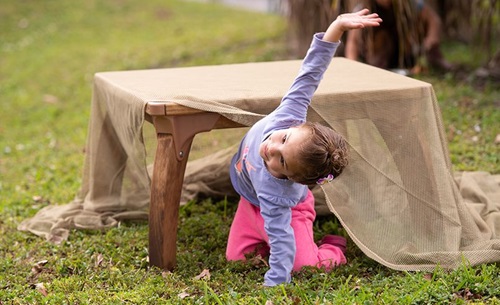The Role of Dramatic Play for Young Children
How dramatic play fosters social/emotional development
| May 2025"All children are born with the disposition to make sense of their experiences."—Lilian Katz
Dramatic play is a powerful tool children use to make sense of events in their lives, to better understand themselves, and to explore the emotions and perspectives of others. This supports the development of emotional regulation, executive function, social competence, and empathy. However, dramatic play benefits children in many ways beyond social and emotional well-being. It also supports children’s cognitive and physical development. And most importantly it’s fun!
It is playtime at a local childcare facility, and the children have decided to play “bus.” The children line up chairs in rows. One child looks through the loose parts bin to find items to create a steering wheel. Another child grabs a bell from the housekeeping area to use to signal stops. There are negotiations about who will pretend to be the bus driver. Madison makes a list of the stops on this route and decides that she is going to get on at Main Street. Juan thinks about whether the baby doll stroller will fit on the bus and what he should pack in the diaper bag. As the children talk amongst themselves and collaboratively make decisions, James calls out, “We need the money!” Ciara and James go to the art area and create paper money. Julia mentions that when she rides the bus, her mother uses a phone to pay the fare. The children create phones in the art area to use in their play.
This dramatic play project was inspired by 4-year-old Julia whose family recently moved to the city and started riding public transportation. Julia’s teachers noticed that she has started to initiate games of playing “bus” and “subway” with her peers. They also noticed that she explains to her dolls about the importance of holding hands when running errands. For Julia this dramatic or pretend play is a way to work through her feelings about moving to a new city and adjusting to a different environment. Through dramatic play, children process their emotions in a healthy way and develop a feeling of control over their lives.
Dramatic Play and Mental Health
Dramatic play offers children a safe and creative space to process, understand, and express complex emotions and adjust to change. For example, Julia uses pretend play to navigate the challenges of her family’s recent move. When Julia started riding public transportation, she began to explore what it meant to be a bus rider through her play. Julia did not have a say in her family’s decision to relocate, however, when Julia engages in “bus” play, she is able to take control of the situation, giving her a sense of agency in a world where so many of the decisions are out of her hands. Through this process, dramatic play helped Julia better understand her emotions, regain a sense of control, and manage the uncertainty that comes with this life transition.
Dramatic Play and the Development of Empathy
When children engage in pretend play, they step into the roles of different characters. For example, in the “bus” project, one child assumed the role of the driver, while others became passengers. The process of adopting new roles encourages mental flexibility and perspective-taking, as children adopt these characters, they begin considering what people other than themselves might think, say, do, and feel. By exploring these varied viewpoints, children begin to develop empathy, a crucial skill for understanding and connecting with others. This ability to imagine and relate to different perspectives not only enriches their play but also strengthens their social interactions in real life.

Emotional Regulation and Executive Function Through Dramatic Play
As children learn to identify emotions and motives in others it supports their understanding of their own feelings. Identifying and labeling feelings forms a crucial first step to developing self-regulation skills.
Additionally, dramatic play functions as a powerful and effective tool for fostering the development of executive function skills in young children. Through dramatic play, children practice and strengthen components of executive function, such as impulse control, working memory, and cognitive flexibility. As children engage in role-playing scenarios, they learn to manage emotions, think critically, and collaborate with peers.
How Dramatic Play Fosters Problem Solving and Creativity
Dramatic play provides countless opportunities for children to practice problem solving skills and use creative thinking. Children use their imagination to create a pretend play script and keep it going. While engaging in “bus” play, the children used problem solving skills and creative thinking to set up the seats, find materials to represent the steering wheel, construct a payment method, and develop a resource with a list of the bus stops. While this article focuses on the social and emotional benefits of dramatic play it is important to note that dramatic play also supports language development, literacy skills, math skills, and scientific thinking as well. Dramatic play is a powerful resource to support children’s development and well-being.

How to Support Dramatic Play
Give the Gift of Time
Children who have not previously had many open-ended dramatic play opportunities may get off to a slow start. Do not be discouraged! There are many children who have not had opportunities for open-ended dramatic play experiences and need a little extra support to get started. Providing unstructured time for children to play is the first step. This allows children to have the opportunity to explore imaginative play.
Give the Gift of Space
Ensure children have enough space both indoors and out to use materials creatively. The “bus” from earlier stretched far beyond the small “home corner” in the classroom. Children benefit from having enough space to move their bodies freely. Having an undefined space should be combined with cozy spaces that feel safe and protected. Cozy or defined spaces can be created by moving furniture to establish a protected nook, utilizing corners in rooms or play yards, and through lofts or playhouses. Providing space with neutral color tones and inspiration from natural materials creates a backdrop for children’s imagination to flourish.
Provide Invitations to Play
Some children are unsure about how to get started with pretend play. There are strategies educators and families can use to encourage and foster play skills.
Observe children – When we listen carefully to children, observe their body language, and watch how they play, we gain valuable insight into their thoughts, emotions, and any underlying worries or concerns. Adults can use these observations to thoughtfully add props or elements to the environment that encourage and support related play, helping children express and work through their feelings in a natural and meaningful way.
Set out materials in an inviting manner - A basket of dress-up clothes on the shelf and a bin of props is a great start. However, it might not inspire play for children who do not have much previous experience. In contrast, when children enter a room and see dolls sitting in chairs around a table, the scene welcomes them in to begin playing. Thoughtfully arranged scenes, or invitations to play, can spark curiosity and provide just the right encouragement to help children engage and begin their play journey.
Support with our presence – As children begin to engage in dramatic play it helps for adults to stay close and support with our presence, even join in the play script. To support dramatic play adults can facilitate roles and ask questions that prompt discussion such as, “Where should the family go? What will they serve at the party? Should we have a menu?” or “What should we use for money?” Once children have practice with dramatic play, they will need less support and start to sustain play independently.
Conclusion
Dramatic play activities engage children in an impactful way while they have fun and learn about emotions, perspective-taking, developing self-regulation, and executive function skills. All children benefit from pretend play, although it is particularly powerful for those facing challenges such as trauma, intense emotions, or difficulties with social connections. Educators, caregivers, and families can enhance these experiences by offering ample unstructured playtime, creating inviting spaces, and modeling play scripts as they interact with children.










